|
Printables |
PowerPoints |
Online exercises |
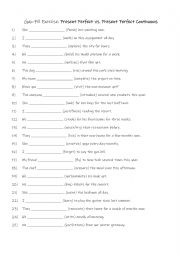
|
B1-B2 Present Perfect vs. Present Perfect Continuous practise
Students complete the gap-fill with the correct tense form using key word in (). Answers on page 2.
Level: intermediate
Age: 11-100
Type:
Downloads: 116
|
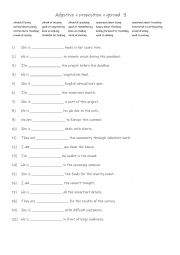
|
Adjective + preposition + gerund 3
Learning adjective + preposition + gerund is essential for natural and fluent English. These structures are common in everyday speech, writing, and exams. They help express ideas accurately, but since prepositions don�t always follow logical rules, mastering them prevents common mistakes and improves overall communication.
Level: intermediate
Age: 10-100
Type:
Downloads: 111
|
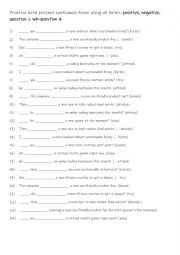
|
A1-A1+ Practise with present continuous tense using all forms positive, negative, question & wh-question 4
Each form is used 6 times! Answers on page 2.
Level: elementary
Age: 7-100
Type:
Downloads: 151
|
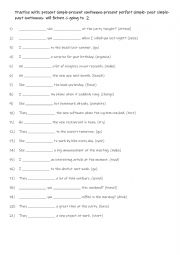
|
A2+-B1 Practise with present simple-present continuous-present perfect simple- past simple-past continuous- will future & going to 2
Students should learn to practise tenses like the present simple, present continuous, present perfect simple, past simple, past continuous, will future, and going to because they are essential for expressing actions in different time frames. These tenses help students describe routines, ongoing events, past experiences, and future plans clearly and...
Level: intermediate
Age: 9-100
Type:
Downloads: 113
|
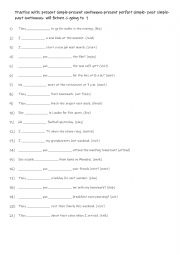
|
A1+ A2 Practise with present simple-present continuous-present perfect simple- past simple-past continuous- will future & going to 1
Students should learn to practise tenses like the present simple, present continuous, present perfect simple, past simple, past continuous, will future, and going to because they are essential for expressing actions in different time frames. These tenses help students describe routines, ongoing events, past experiences, and future plans clearly and...
Level: elementary
Age: 8-100
Type:
Downloads: 122
|
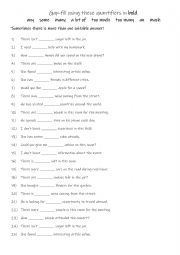
|
A1+-A2 Gap-fill using the 8 quantifiers
Quantifiers help students specify the amount or number of something. This precision allows them to convey their message more accurately. Using a range of quantifiers allows people to vary their language, making speech or writing more engaging and less repetitive. For instance, saying "a few" instead of always using "some" can make your communicatio...
Level: elementary
Age: 8-100
Type:
Downloads: 103
|
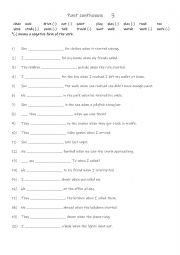
|
Past continuous 3
Learning the past continuous tense is important because it helps students describe actions that were in progress at a specific time in the past. It adds context and detail to storytelling, allowing for clearer descriptions of ongoing past events or interrupted actions. Mastering the past continuous improves fluency and accuracy in both speaking and...
Level: elementary
Age: 7-100
Type:
Downloads: 115
|
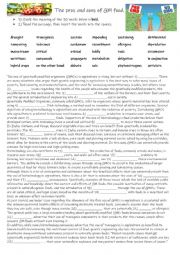
|
The pros and cons of GM food.
1300-Word reading essay with a gap fill exercise about the advantages and disadvantages of GM food. It takes an in-depth look at both sides of the argument.This sheet is suitable for higher level B1 to C1 students of all ages. An answer sheet is included. For higher level students they could be put in groups to give / present their opinions in a pr...
Level: intermediate
Age: 14-100
Type:
Downloads: 1854
|
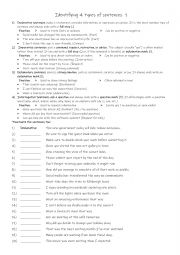
|
A2-B1 Identifying 4 types of sentences 1
Learning to identify the four types of sentences enhances communication, writing, and grammar skills, helping students express ideas clearly and effectively. It also improves reading comprehension by allowing them to interpret tone and intent in texts. A strong understanding of sentence structures leads to better academic performance, particularly ...
Level: elementary
Age: 9-100
Type:
Downloads: 107
|
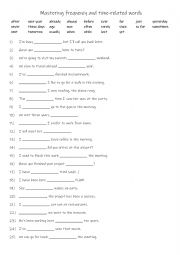
|
B1+ Mastering 25 frequency and time-related words
Using these words naturally makes students conversations more engaging and helps others understand the timing and frequency of events better.Students read and complete the gap-fill sentences with a suitable word in bold. Answers on page 2.
Level: intermediate
Age: 10-100
Type:
Downloads: 142
|
|
|
|
|












